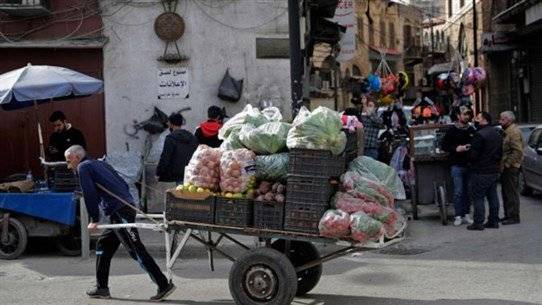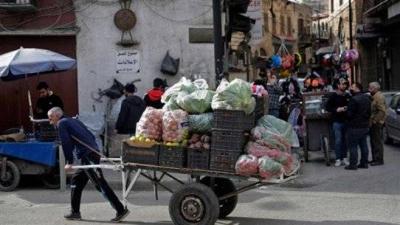Prices in local markets have rapidly increased, influenced by developments in global oil markets. The immediate and sharp response in prices is consistent with what Lebanese people have long known: "If you conceive in Istanbul, you will lag behind." This popular saying, which historically highlighted weak national resilience to external events during Ottoman rule, still applies today in various matters, particularly economic ones. The impact of the reduction by the "OPEC Plus" group in production by 2 million barrels for November and December will not spare any country from the potential rise in prices of various goods and services. This decision has provoked discontent among the largest global economies, highlighting their inability to deal with it through normal means. However, the situation in Lebanon is different. Apart from the evident failure of its officials to take any preventive measures similar to those in advanced countries, the country is "burning" large quantities of imported oil derivatives estimated at between 6 to 7 million tons, producing only smoke and increasing pollution. There are no heavy industries or even light ones producing added value, no vast areas requiring lighting, no central heating and cooling systems, and no giant ports needing service... All consumption goes to car fuel, and the state has failed to implement a public transport plan.
The price of gasoline exceeds 700,000 lira. The first consequence of the global oil production cut was reflected in an increase in prices of various oil derivatives. The increase in the price of imported gasoline by nearly $10 per kiloliter led to a local increase in the price of a canister by 11,000 lira, bringing it to 710,000 lira. Meanwhile, the price of a canister of diesel rose by 21,000 lira due to a $23 increase in the price of imported kiloliters, now totaling 831,000 lira. The price of a gas cylinder reached 431,000 lira.
The second impact was an increase in demand for dollars to purchase the same quantity of fuel. This is particularly evident given the weak elasticity of oil derivatives due to the lack of alternatives for citizens. Despite the 400% rise in gasoline prices from mid-2021 to the present, consumption only declined by 14%. Consequently, the direct relationship between global oil prices and the exchange rate of the dollar in local markets will exacerbate the collapse of the national currency. The outcomes will multiply in the pricing mechanisms for various goods and services.
The third impact involves the continuous increases in oil prices, expected to reach $120 per barrel, potentially absorbing all the increases granted to public and private sector salaries and transportation allowances in the 2022 budget. The daily commuting cost set at 95,000 lira, which is not paid regularly, has lost its relevance, and overall salaries with increases will be less than $150 for most employees. This will perpetuate the cycle of closure and dramatic decline of institutions, according to economic and financial expert Dr. Hussein Traboulsi. The increases and social assistance that were enacted have lost part of their value first when discussed and then again upon approval. Upon allocation, they have lost more than 300% of their value due to price increases and an ongoing decline in purchasing power.
The fourth and most severe impact is the competition among various sectors, particularly those representing public sector employees, for a larger share of the remaining funds and resources in a bankrupt country, says union representative Dr. Ghassan Sleibi. "The only viable approach that would secure everyone’s rights is joint action and negotiation with the authorities regarding economic and social policies related to recovery, which we do not see happening in Lebanon. As long as unions and labor organizations do not participate in a structured manner in shaping national social and economic policy, positions remain reactive to specific economic situations." According to Sleibi, in this phase, unions should enhance and expand social dialogue among themselves and with the authorities to produce agreements that consider inflation rates and the decline in purchasing power of salaries and wages, while simultaneously preserving wage balance and the economy’s capacity to endure them. This should occur at the general level through social dialogue institutions in the country or through collective bargaining negotiations that unions conduct across various sectors.
The fifth impact will be on the rising prices of various goods and services directly linked to fuels, primarily affecting private generator bills and transportation fares. Although Lebanon will not be the only country affected by potential fuel price increases, unlike most countries, there are no defensive lines or preventive measures in place to cushion the shocks from global market fluctuations, according to Traboulsi. Countries grapple with crises by setting up economic emergency plans, as seen clearly during the COVID-19 era. Today, we witness European countries taking measures to rationalize consumption, stockpiling oil and gas in large quantities, diversifying energy sources, transitioning to alternative energies, ensuring community protection for their citizens, and alleviating the remaining living costs. "But in Lebanon, the state spends without productivity, fails to devise an economic plan, surrenders to monopolists whether they are generator owners or crisis traders, and oversight is almost entirely absent; although the solutions capable of mitigating the harm to citizens are not impossible if there is determination to make the right decisions."
In light of this reality, a fundamental question arises regarding the reasons for halting the mechanism to set gasoline prices based on the average global price per ton during the three weeks preceding the publication of the price setup table. This mechanism was initially established to protect companies and therefore citizens from the risks of price fluctuations. If the justification is the rapid changes in the daily exchange rate of the dollar, should the ministry then stop issuing the "table" and allow prices to be determined in the markets according to free competition?
In a context where transparency is lacking and logical alternatives to fuel consumption are absent, social benefits are shrinking, and national immunity is weakening... any increase, even by a few cents, in global oil prices will hit the Lebanese like a hammer.
In this regard, the Central Bank of Lebanon issued a decision identified as number 13484, requesting banks, exceptionally, to obtain its prior approval to open credits or pay invoices related to importing oil derivatives (gasoline, diesel, gas). The decision was accompanied by a circular obligating banks to maintain a free external account free of any obligations to their foreign correspondents, which should not be less than 3% of the total deposits in foreign currencies as of September 30, 2022. According to banking risk expert Dr. Mohammad Fhayli, this is due to "the exposure of some Lebanese commercial banks to foreign correspondent banks in the past period, meaning they have refrained from strengthening their reserves that support opened credits. This has impacted the banks' reputation abroad on one hand and shifted the burden of fulfilling obligations to the Lebanese Central Bank in some instances on the other hand. This explains the Central Bank's request for prior approval before opening credits, especially for oil imports, ensuring the bank is not exposed to foreign correspondent banks."
While the process of opening credits between traders and banks should not be subject to Central Bank oversight, particularly if it involves non-subsidized cash dollars, there appears to be a hidden concern reflected in banks presenting the Central Bank as a guarantee for repaying past due payments.
On another front, monitoring sources note that the Central Bank's decision raises questions about whether it continues to provide dollars to importers based on the parallel market exchange rate, hence its preference for not inflating or exaggerating invoices amidst rising global prices. Clarification is needed from the Central Bank and the importing companies.




